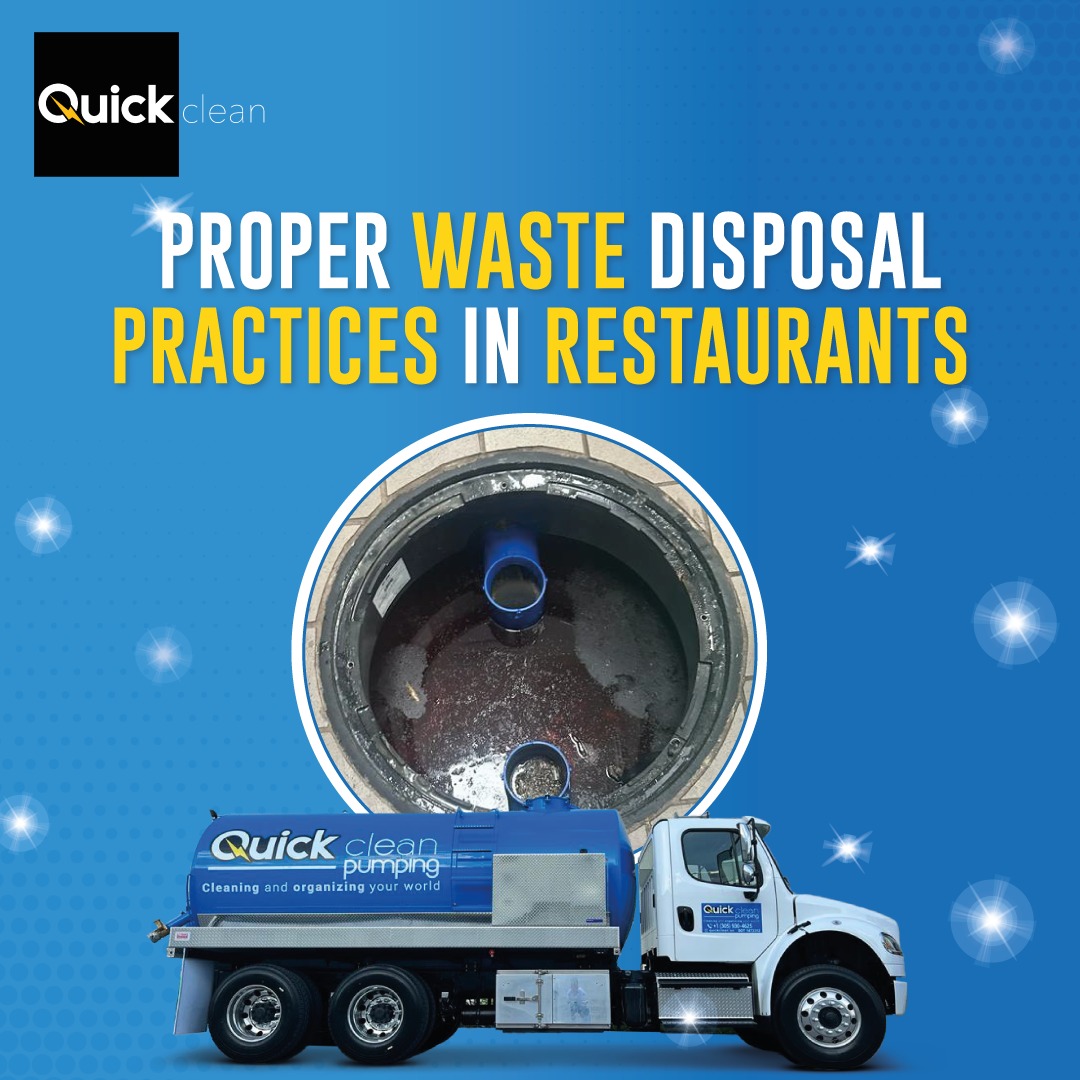Proper waste disposal practices are crucial for maintaining a clean and efficient restaurant operation. One key aspect of this is managing the cleaning of grease traps effectively to prevent blockages, odors, and potential compliance issues. This comprehensive guide explores best practices for waste disposal in restaurants, focusing on keeping grease traps clean, and explains why Quick Clean stands out as the premier choice for professional cleaning services.
Understanding Grease Traps
Grease traps are designed to intercept fats, oils, and greases (FOG) from wastewater before they enter the sewage system. These substances, if not intercepted, can solidify and cause blockages in the pipes, leading to costly repairs and environmental damage.
Best Practices for Waste Disposal in Restaurants
It’s clear that managing waste efficiently not only contributes to operational cleanliness and efficiency, but also plays a significant role in environmental sustainability. Here’s a deeper dive into these practices:
-
Educate Your Staff
The first line of defense against waste-related issues is a well-informed team. Comprehensive training sessions should be conducted to educate staff on the environmental and operational impacts of improper waste disposal. Highlight the role each employee plays in minimizing waste and maintaining a clean, efficient kitchen. Emphasize the importance of sorting waste, with clear instructions on what goes into compost, recycling, and trash. Regular reminders and incentives can motivate staff to adhere to best practices.
-
Install Sink Strainers
Sink strainers are simple yet highly effective tools in preventing large solid wastes from entering the drainage system. Choose strainers that fit your sinks perfectly and ensure they are durable and easy to clean. Regular checks should be part of daily closing routines to clean these strainers and avoid accumulation of debris, which could lead to reduced water flow and potential backups.
-
Properly Dispose of Cooking Oil
Cooking oil disposal requires special attention due to its potential to cause severe blockages and environmental harm if not handled correctly. Create a designated area in your kitchen for oil storage, and ensure all staff are aware of this procedure. Partnering with a reputable recycling or disposal service not only ensures compliance with local regulations but also contributes to a circular economy by allowing used oil to be converted into biofuel or other products.
-
Regular Maintenance and Cleaning
A proactive approach to grease trap maintenance is essential for smooth operations. Work with a professional cleaning grease traps service to develop a maintenance schedule tailored to your restaurant’s size and volume of waste. This schedule should include regular inspections, cleanings, and any necessary repairs. Documentation of all maintenance activities is crucial for regulatory compliance and can also provide valuable insights into your waste management practices, identifying areas for improvement.
The Importance of Cleaning Grease Traps
The significance of maintaining clean grease traps in the restaurant industry cannot be overstated. Beyond fulfilling regulatory mandates, the practice is indispensable for ensuring the smooth operation of a restaurant’s kitchen and safeguarding the dining atmosphere. Let’s delve deeper into the reasons why cleaning grease traps is essential:
-
Prevent Blockages
The accumulation of fats, oils, and greases (FOG) in the sewage system is a primary cause of blockages, which can lead to backups and overflows. These incidents not only disrupt restaurant operations but can also result in significant repair costs. Regular grease trap cleaning minimizes the risk of FOG buildup, ensuring that wastewater flows freely through the plumbing system. This proactive measure protects against the inconvenience and expense of unanticipated plumbing emergencies.
-
Eliminate Odors
Grease traps that are not regularly cleaned can become sources of foul odors, as the decomposing organic matter releases unpleasant smells. These odors can permeate the restaurant, negatively impacting the dining experience for customers and creating an undesirable work environment for staff. Maintaining a clean grease trap is crucial for preserving the overall ambiance of your restaurant, contributing to a more pleasant and welcoming atmosphere for everyone.
-
Avoid Penalties
Adhering to local health and environmental regulations is a fundamental responsibility of restaurant ownership. These regulations often stipulate specific requirements for the maintenance and cleaning of grease traps to prevent FOG from entering the public sewage system. Failure to comply with these regulations can result in fines, penalties, and in severe cases, the closure of the establishment. Regular grease trap cleaning is, therefore, not only a matter of operational efficiency but also of legal compliance.
In addition to these primary benefits, clean grease traps contribute to the broader environmental effort to protect water quality and prevent pollution. By preventing FOG from entering waterways, restaurants play a part in preserving local ecosystems and promoting sustainability.
The importance of cleaning grease traps extends far beyond regulatory compliance. It is a vital practice that supports operational efficiency, enhances the dining experience, and demonstrates a commitment to environmental stewardship. Restaurants that prioritize regular grease trap maintenance will find that this practice pays dividends in the form of smoother operations, satisfied customers, and a reduced environmental footprint.
Frequency of Cleaning
The frequency of cleaning depends on several factors, including the size of the grease trap, the volume of FOG your restaurant produces, and local regulations. As a general rule, grease traps should be cleaned when 25% of the liquid layer is FOG. For many restaurants, this means monthly cleanings, but some may require more frequent service.
Why Contract a Professional Cleaning Service
- Expertise: Professional services have the expertise and equipment to clean grease traps efficiently and thoroughly.
- Compliance: Professionals ensure that your grease trap cleaning practices comply with local regulations, helping you avoid fines.
- Safety: Cleaning grease traps can be hazardous. Professionals have the necessary training to handle these risks safely.
Quick Clean: The Premier Choice for Grease Trap Cleaning
Quick Clean stands out as the best option for professional grease trap cleaning for several reasons:
- Emergency Services: We offer emergency services to address urgent issues, ensuring that your operations continue smoothly.
- 24/7 Availability: Our team is available around the clock, providing peace of mind that we’re always here when you need us.
- Professional Team: Our skilled technicians are trained to handle any grease trap cleaning challenge with efficiency and expertise.
- State-of-the-Art Equipment: We utilize modern trucks and equipment to provide superior cleaning services.
Choosing Quick Clean for your grease trap cleaning needs guarantees a hassle-free, compliant, and efficient solution to managing restaurant waste. With our commitment to quality, availability, and professional service, we ensure that your restaurant’s waste disposal practices are sustainable, effective, and aligned with the highest industry standards. Keep your operations clean and compliant with Quick Clean, where clean grease traps are just the beginning of our comprehensive waste management solutions.

